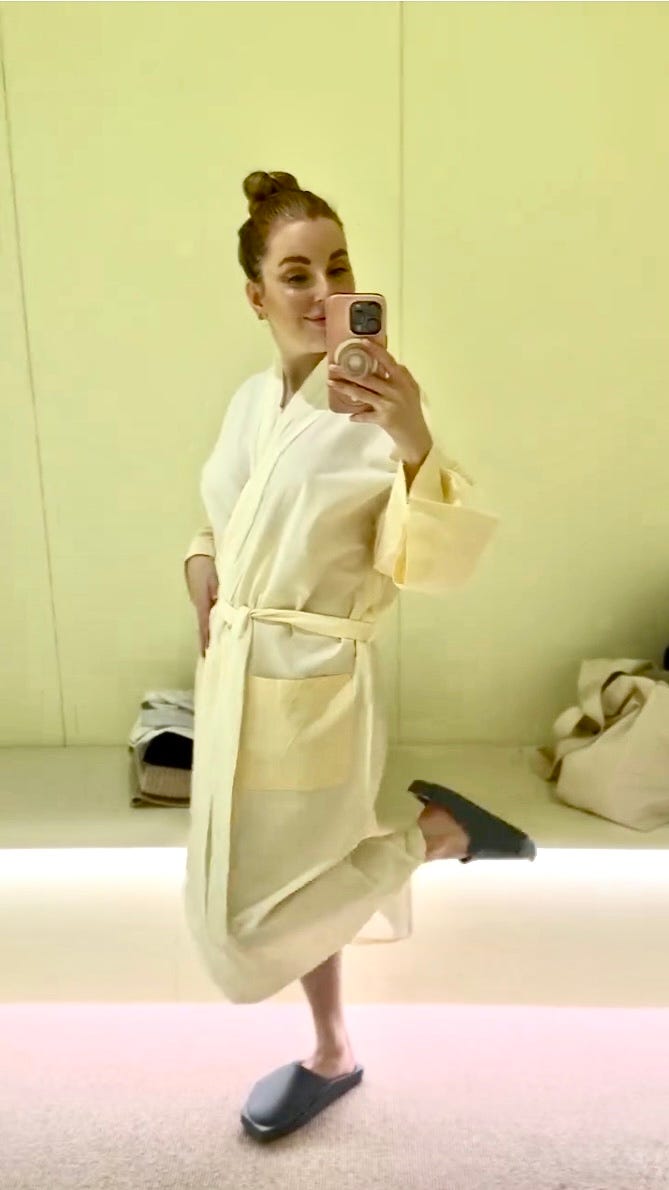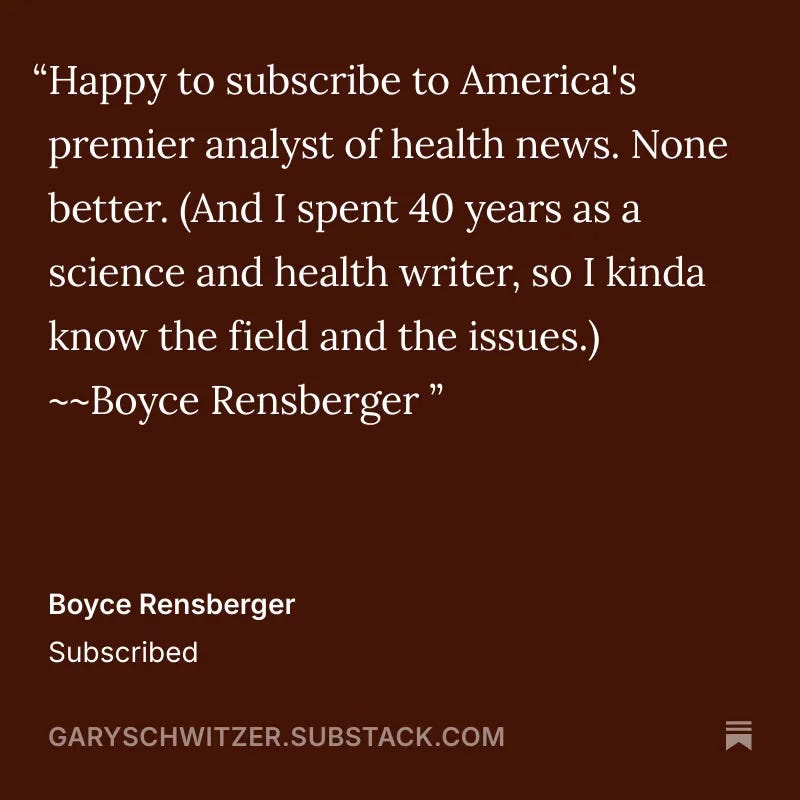Too much glitz, too little evidence, in full body scan stories
How new screening tests get free and glowing publicity
A friend sent me the following article, thinking I’d be interested since I’ve often criticized journalists doing stories about themselves getting screenings such as full body scans.1 2 3 On social media, the writer posted:
The headline of the story was:
I got the health scan that 100,000 people are on the waitlist for
When I read it, my initial thoughts were:
Here we go again;
I’d love to address this, but this was by an ex-journalist, who “now advises early- and late-stage healthcare companies on go-to-market strategy, storytelling, and fundraising.” What do you expect you’re going to get from that perspective?
But I was grinding my teeth when I read some of her creampuff quotes:
“for those who choose to get a Neko scan, it’s a big perk.”
“All in, I would recommend it to any friend passing through London or Sweden if they can get an appointment before Neko lands in America. And I’d be intrigued to try it again next year!”
I still wasn’t going to write anything. But then I did a web search on news coverage of these Neko scans. It was largely a gold mine - of garbage.
Just this week, on the same day as the previous article was posted, The Independent published:
This £300 scan promises a complete look at your health, helping you avoid illness in the future – is it worth it?
£300 = $405. The story referred to The Independent’s reporter undergoing “the full body health scan that’s being hailed as the future of preventative care.” Somehow, she and other journalists are able to skip the highly-touted 100,000-person waiting lines because they were invited to be scanned by the Neko company itself. Oddly, though, this story said the waiting line was down to 10,000. On the same day it was 100,000 in the earlier article. Wow. First, though, time for another photo of the journalist in a robe.
She wrote:
Where do we even begin with private and personalised testing if we don’t know what we should be testing for? …
When you consider how much it’s worth in comparison to individual testing appointments and what you get for your money, I actually think the price is pretty decent.
Back in January, the beauty director at Glamour UK wrote:
I tried the full-body scan with a 40k waitlist – this is what I learnt about my health
The beauty writer could barely contain her enthusiasm:
The scan mapped 50 million health data points on my body. …
I'm seriously impressed. I regularly write about wellness tech and super supplements - and incorporate many of them into my daily routine alongside a (mostly) healthy diet and a pretty basic exercise routine.
But Neko Health has gone beyond the ceiling of a simple blood test to deliver the most detailed and thorough health check I've ever experienced.
Between the 10K, 40K or 100K waiting list estimates and now the 50 million health data points, I am totally lost. She, too, got a selfie of herself in a robe ready to be scanned.
In February, the British version of Vogue magazine published this:
I Tried The New £299 Health Scan With A 40,000-Strong Waitlist… Was It Worth It?
The reporter wrote:
I left feeling buoyed, reassured even, and booked in for a follow-up appointment in a year’s time to keep building this comprehensive picture of my health.
Harper’s Bazaar published a piece by another beauty writer:
I tried the in-demand Neko Health body scan, and this is what I learned
She had a couple of quotes that were journalistic beauties:
There's a reason that 100 thousand people are on its waiting list; this preventative health scan is a game-changer. …
Is it worthwhile? Absolutely, and the data supports this.
Well, the “supportive” data she cites was spoonfed to her by the company and apparently has not appeared in any peer-reviewed journal - at least none I could find.
Back in September of 2024, The Guardian published this story:
I tried the £299 full-body scan that checks health risks in minutes
Although the paper’s science correspondent jumped at the chance to show herself in a robe….
…she at least included expert caveats that the prior articles overlooked.
“However, at this stage, it is difficult to assess its utility without having a full understanding of their methodology, the way they analyse the ‘scans’, and, importantly, the depth, breadth and diversity of the training datasets used for generation of their AI models and algorithms.”
Prof Azeem Majeed, a GP and expert on primary care and public health at Imperial College London, said that “dealing with the rapid developments in private medical assessments will be challenging for the (British National Health Service) and it is essential that these assessments add value to people’s health and do not create additional work (or anxiety for customers) without clear benefits”.
More than year ago, the New York Times also published a piece on Neko:
It felt very similar to the other stories I read, but this one had an emphasis on the business angle - “Investors see potential.” But this was the only story I read that featured a male journalist being screened. Unlike some of the other journalists, he paid to be screened. But like most of the women above, he was shown in photos during the process.
But at least he, too, included some expert caveats:
In the United States, most major health insurers don’t typically cover such scans. And some in the medical field question their effectiveness. “To date, there is no documented evidence that total body screening is cost-efficient or effective in prolonging life,” the American College of Radiology said last year. One issue is false positives, said Dr. Nils-Eric Sahlin, a professor of medical ethics at Lund University in Sweden. He said that could lead to a wave of healthy people seeking a second opinion, potentially overwhelming the most stressed parts of the health care system, and adding costs for potentially unnecessary follow-up treatment.
No story that I saw offered any details on the three clinical studies that Neko says are underway. I couldn’t find any data, nor any peer-reviewed publications, on Neko’s website.
No story I’ve seen did analysis as thoroughly as that done by a non-journalist, David Gorski, MD, two years ago:
His conclusion:
Unfortunately, whether AI can succeed in this is very much an open question, but that doesn’t stop these companies from using AI as a marketing buzzword to sell their product before it’s been proven superior (or at least not inferior) to existing diagnostics.
I’ll end with the classic quote from Sir Muir Gray, former Program Director of the UK National Screening Committee:
“All screening programs do harm; some do good as well.”
No matter the source, if you’re reading or hearing about a new medical technology - a new screening test, whether it’s a full body scan or something else - you should look for more emphasis on evidence (such as data on false positives, false negatives, etc.) - than emphasis on the gee-whiz factor (like 50-million health data points). If you get sucked in by one of these promotions without knowing about the possible downstream effects of such a test, you may experience more harm than good.














I could write paragraphs on the fallacy of the Total Body Scan Industrial Complex - and indeed I have. Ordinary folks who are not medical professionals are understandably seduced by the scan’s promise of early detection, primarily of cancer. And, yes there have been triumphant anecdotes, but an anecdote is not data. To summarize, an abnormality detected on these screening scans is much more likely to be a false positive or an innocent lesion which once found, will been to be attacked by the medical professionals. Medicalizing innocent lesions in the lung, liver or pancreas, for example, exacts a huge cost financially and emotionally. And yet, the public falsely believes that there is no risk and only potential upside. My advice? Resist!
It’s all about the marketing with these investor owned scans. And there are no checks or limits
on lying claims and paid endorsers. You are correct…we’ve been here before. Now we have social media influencers and the lure of “AI” to suck the public in. If someone has discretionary $$ to spend on prevention I would recommend a trainer, nutritionist and maybe a Galleri Blood test. At least cfDNA has some science and studies behind it and might just pick up something real without the false positives.